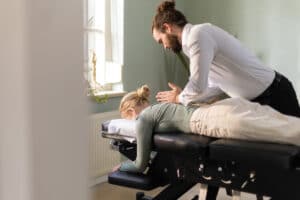Care for Hernia Problems
The herniated disc is clearly one of the most common complaints in which we can help people in our practice.
Hernia problems are very common and also extremely persistent. Many thousands of people in the Netherlands suffer from herniated discs. All of these patients have the same cause of symptoms; the entrapment of a nerve in the spine.
We would like to inform you about our care for hernia complaints. At the bottom of this article, you can read about how we care for people with herniated discs.
THE ROLE OF THE CHIROPRACTOR
The chiropractor is not only involved in complaints, precisely
Prevention of symptoms is the specialty of chiropractic ….
First of all, what is a hernia?
The spine consists of vertebrae that provide strength to the back and protection to the spinal cord. Between the vertebrae are soft discs that absorb pressure, thus making the spine more flexible and ensuring that vertebrae do not rub against each other. These discs are called the intervertebral discs.
A herniated disc involves a bulging of the soft part of such an intervertebral disc. The contents of disc then press on a nerve, causing symptoms.
We regularly see that subluxations are a preliminary stage of a herniated disc. This subluxation can weaken the spinal discs, triggering a herniated disc.
What Complaints Occur in a Hernia
The most common complaint with a herniated disc is back pain that often radiates to the legs. In addition to pain, there is often tingling, stiffness and sometimes loss of function.
The back pain occurs in the region around the actual herniated disc but can also occur higher or lower. People often report that the pain gets worse while sitting or standing and that some specific postures reduce the pain.
A characteristic of herniated disc symptoms is that postures in which the vertebrae are given a lot of space (for example, lying hunched over) produce the least pain and symptoms.
What can you do yourself against a Hernia?
Thus, a herniated disc involves entrapment of nerves in or adjacent to the spine. There are a number of things you can do yourself to give the nerves more space.
Provide adequate, gentle exercise. Often cycling and swimming are very appropriate. This will keep your muscles supple. In addition, good posture while working, watching television, sleeping, etc. is very important. Good posture reduces strain on your back.
Needless to say, it is not wise to sit in a car for hours or perform heavy physical labor with a herniated disc.
Our Care for Hernia Pain
The chiropractor has even more options in his arsenal. Our anatomical knowledge and years of experience provide targeted help.
We can give your vertebrae extra space through manual manipulations. This reduces the entrapment.
As the entrapment diminishes, the symptoms diminish, creating more opportunities for further healing. It is then important to strengthen the muscles around the spine through targeted exercises that will further relieve the back.
In addition to these physical interventions, more is often needed for optimal health. In fact, it may be that certain habits in terms of diet, work, behavior, etc., create additional vulnerability.
We will therefore work with you not only to look at the area of the herniated disc but also to dig deeper into the possible triggering factors.
Our goal here is always not to suppress symptoms but to give the body another chance to restore itself.


